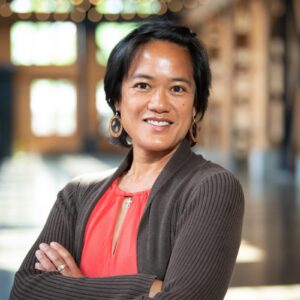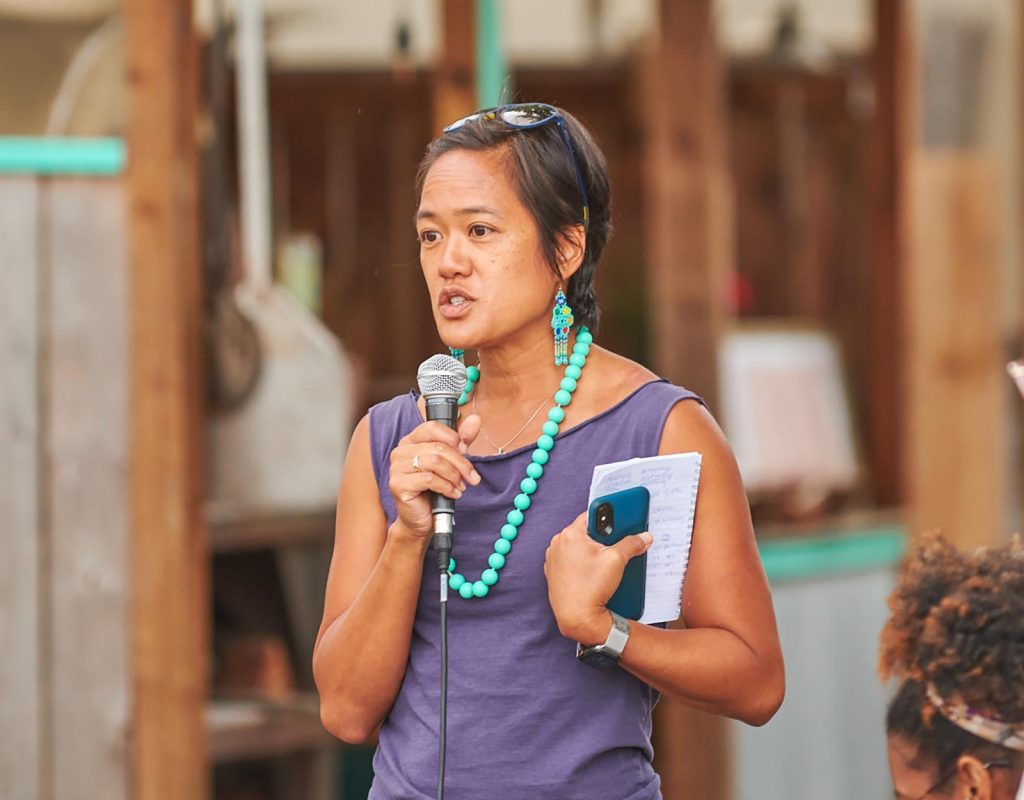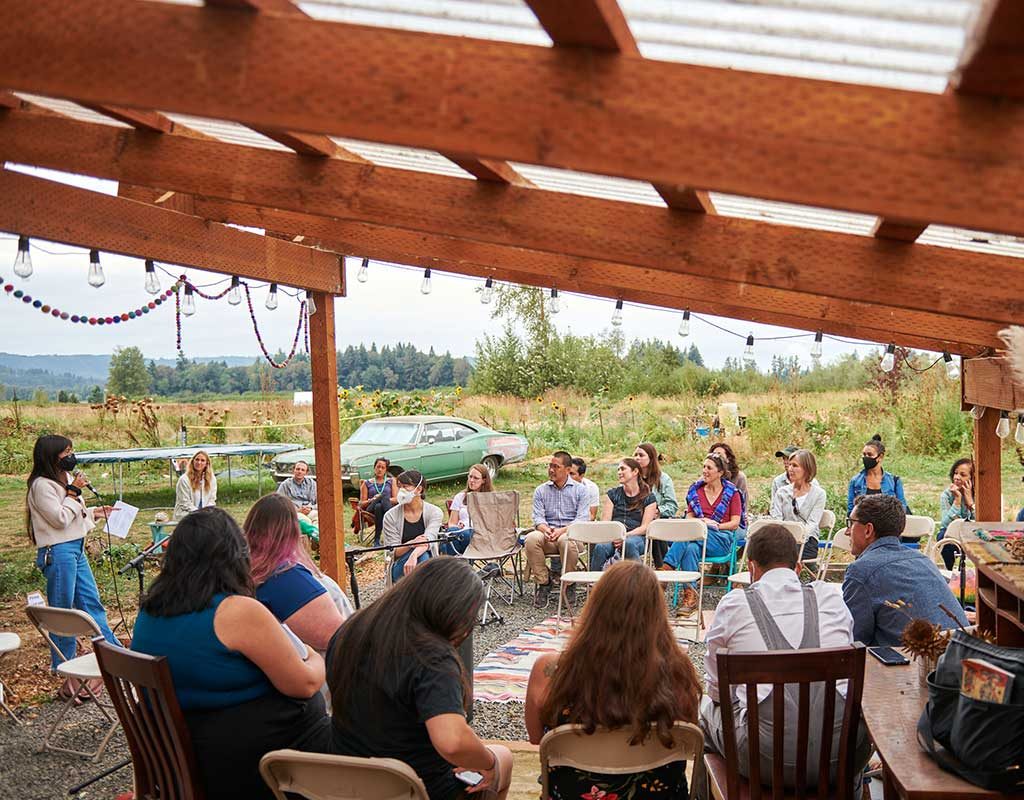
Interim Executive Director & Chief Impact Officer
Ecotrust staff, board, and partners, during a field trip to Wapato Island Farm in September 2022. Photo credit: Jason Hill
A reflection and programmatic update from our Interim Executive Director, Olivia M. Rebanal
Autumn is always a reflective time for me. I grew up on the West Coast, and I left my home and family to move to the East Coast at age 17. When leaves started turning colors and I was chilled to the bone like never before, I asked myself, “Why am I here?”
As we turn the season, I find myself asking that same question again.
I was drawn to Ecotrust for its simple-yet-lofty ambition to weave together these three Es: equity, economy, environment. Last year, we wove together these three threads to create the tapestry that is our strategic plan. Today, I am proud to say that I firmly believe we are advancing the six goals we set in that plan.

Olivia M. Rebanal. Photo credit: Jason Hill
Over 2022, I see us moving powerful, community-centered and self-determined initiatives for climate resilience, intergenerational wealth-building, and lands and waters stewardship. I see us leveraging Ecotrust assets to make impact at scale. And I see us investing in our people and in our organization, moving with intention to become an anti-racist organization equipped to lean into and lead transformation work across our region.
I am grateful for our many valued partners in this effort, as well as for this opportunity to share highlights from the work we’ve been doing together in 2022:
A collaboration of four tribes to restore ecological resilience along California ocean and coastal territories has been forming over the past four years with Ecotrust support. On October 6, 2022, we celebrated as the Tribal Marine Stewards Network was formally launched.
The Pacific Northwest Black, Indigenous and People of Color (BIPOC) Food Systems Network is growing, with coalition co-management support from Ecotrust. The network of farmers, producers, food distributing organizations, and food justice advocates has recently secured support from King County to continue its emergent work to strengthen an inclusive food system across the region.
Ecotrust is now the owner-operator of Salt & Soil Marketplace, an online food hub in Southeast Alaska. The Marketplace is one of a number of collaborative efforts to support a local workforce of food producers, increase food security, and invest in creating a local economy for traditional and regionally-specific foods by supporting partners in rural and Alaska Native communities.
“
Ecotrust is currently sustaining 52 active projects and 165 partnerships from Northern California to Alaska.

During a field trip to Wapato Island Farm, Ecotrust board and staff listen to panelists comprising Ecotrust program staff members and program partners. Photo credit: Jason Hill
A cohort of 15 food system leaders has completed the inaugural Viviane Barnett Fellowship for Food System Leaders, an 18-month experience modeling new ways to build community and lead projects that promote food justice, land and water stewardship, climate resilience, and community healing. Collaborative by design, the Viviane Barnett Fellowship is a collective effort, co-led by Ecotrust in partnership with the Black Food Sovereignty Coalition, Mudbone Grown, Oregon State University’s Center for Small Farms, and the Multnomah County Health Department REACH program.
As I uplift these specific examples of our strategies in action, I also want to underscore that we are pursuing this community-centered and self-determined approach at scale. Ecotrust is currently sustaining 52 active projects and 165 partnerships from Northern California to Alaska. We have substantial numbers of partners that are BIPOC-led across all our goals, and each of our collaborative projects are designed to address our three Es: 75 percent of our projects advance climate resilience, 63 percent of our projects support intergenerational wealth-building, and nearly all (94 percent) of our projects contribute to lands and waters stewardship.
A strength of our strategic plan is the connection it makes between transformational work in our communities and transformation in our organization. The actions we are taking at Ecotrust to build an anti-racist organization with a culture of belonging and a resilient business model enable us to lean into and lead towards the vision and outcomes named in our five-year goals.
During this year of executive leadership transition at Ecotrust, staff and board worked side-by-side to co-create an ideal for our next executive director and strengthened power-sharing practices across the organization. Our efforts towards transparency and accountability are also expanding. We released our first Indicators Report, and we continue to evolve our measurement program to include more profound indicators of progress towards intergenerational wealth building; cultural and ecological restoration and stewardship; and climate justice and resilience.
This autumnal season also brings celebrations of gratitude. I am grateful to our partners who trust us at Ecotrust to steward our three Es. A year into the work of our strategic plan, we are progressing in the forests, coastal communities, city parks, rivers, and farms of our region. In so doing, the people of our communities are also activating through our efforts to cultivate diverse leaders in inspired communities.
Our goals are connecting us to this place, to our communities, and to each other. Together, we advance in our transformational quest at the intersection of equity, economy and environment.
Thank you for being here, now, with Ecotrust.
In 2020, we set out to create a strategic plan for greater impact in our region. More than 100 people—including staff, board, and partners—came together to create this plan that will guide the next five years of our work.